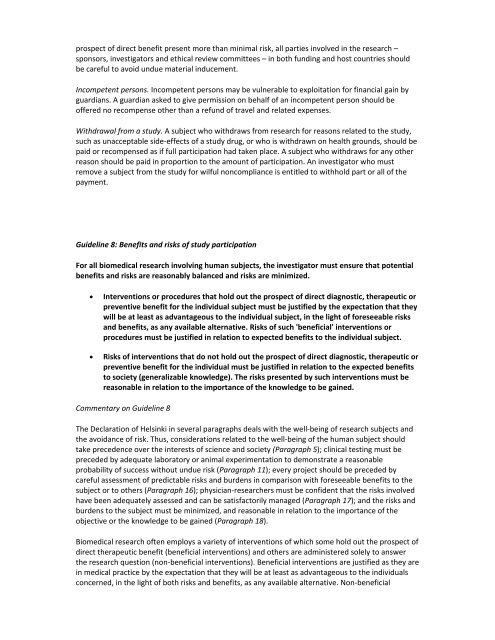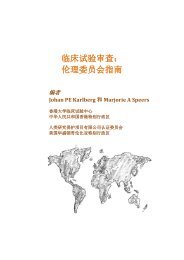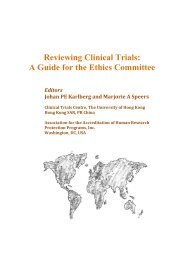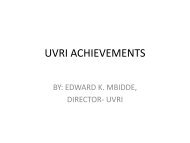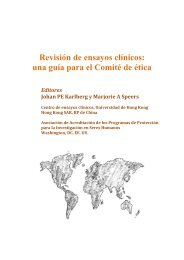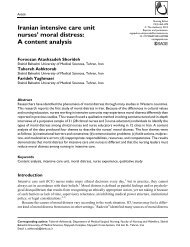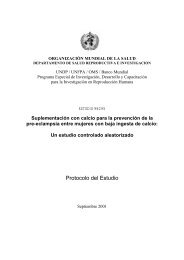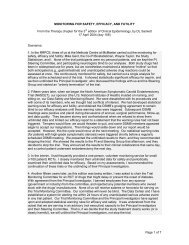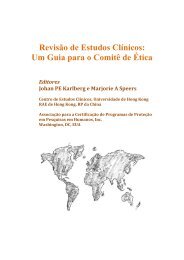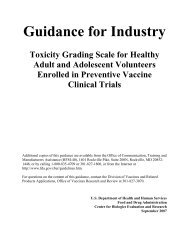CIOMS Guidelines - Global Health Trials
CIOMS Guidelines - Global Health Trials
CIOMS Guidelines - Global Health Trials
- No tags were found...
You also want an ePaper? Increase the reach of your titles
YUMPU automatically turns print PDFs into web optimized ePapers that Google loves.
prospect of direct benefit present more than minimal risk, all parties involved in the research –sponsors, investigators and ethical review committees – in both funding and host countries shouldbe careful to avoid undue material inducement.Incompetent persons. Incompetent persons may be vulnerable to exploitation for financial gain byguardians. A guardian asked to give permission on behalf of an incompetent person should beoffered no recompense other than a refund of travel and related expenses.Withdrawal from a study. A subject who withdraws from research for reasons related to the study,such as unacceptable side-effects of a study drug, or who is withdrawn on health grounds, should bepaid or recompensed as if full participation had taken place. A subject who withdraws for any otherreason should be paid in proportion to the amount of participation. An investigator who mustremove a subject from the study for wilful noncompliance is entitled to withhold part or all of thepayment.Guideline 8: Benefits and risks of study participationFor all biomedical research involving human subjects, the investigator must ensure that potentialbenefits and risks are reasonably balanced and risks are minimized.• Interventions or procedures that hold out the prospect of direct diagnostic, therapeutic orpreventive benefit for the individual subject must be justified by the expectation that theywill be at least as advantageous to the individual subject, in the light of foreseeable risksand benefits, as any available alternative. Risks of such 'beneficial' interventions orprocedures must be justified in relation to expected benefits to the individual subject.• Risks of interventions that do not hold out the prospect of direct diagnostic, therapeutic orpreventive benefit for the individual must be justified in relation to the expected benefitsto society (generalizable knowledge). The risks presented by such interventions must bereasonable in relation to the importance of the knowledge to be gained.Commentary on Guideline 8The Declaration of Helsinki in several paragraphs deals with the well-being of research subjects andthe avoidance of risk. Thus, considerations related to the well-being of the human subject shouldtake precedence over the interests of science and society (Paragraph 5); clinical testing must bepreceded by adequate laboratory or animal experimentation to demonstrate a reasonableprobability of success without undue risk (Paragraph 11); every project should be preceded bycareful assessment of predictable risks and burdens in comparison with foreseeable benefits to thesubject or to others (Paragraph 16); physician-researchers must be confident that the risks involvedhave been adequately assessed and can be satisfactorily managed (Paragraph 17); and the risks andburdens to the subject must be minimized, and reasonable in relation to the importance of theobjective or the knowledge to be gained (Paragraph 18).Biomedical research often employs a variety of interventions of which some hold out the prospect ofdirect therapeutic benefit (beneficial interventions) and others are administered solely to answerthe research question (non-beneficial interventions). Beneficial interventions are justified as they arein medical practice by the expectation that they will be at least as advantageous to the individualsconcerned, in the light of both risks and benefits, as any available alternative. Non-beneficial


